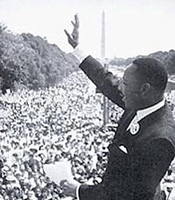We Want More Than The Wars Of Our Fathers.

Currently I've been reading "The Powers That Be" by Walter Wink (notice the "currently reading" section of my blog). The book is challenging both in its message and mode of reasoning, very heavy. The book concerns Jesus' teachings of nonviolence and authority, foremost spelling out how historically authority, and culture for that matter, has been plagued by violence.
I just arrived at the point in the book where Jesus' answer to violence (nonviolence) is explained. Very good timing considering the holiday, who's patron gave, possibly, America's strongest case for nonviolence.
A striking and encouraging insight by Wink is just what Jesus himself meant by nonviolence. The passage most often used is Matthew 5:38-41.
"You have heard that it was said, 'Eye for eye, and tooth for tooth. But I tell you, Do not resist an evil person. If someone strikes you on the right cheek, turn to him the other also. And if someone wants to sue you and take your tunic, let him have your cloak as well. If someone forces you to go one mile, go with him two miles."
Key to understanding this passage is the difference between nonviolence and nonresistance. "The Greek word translated "resist" is antistenai, meaning literally to stand (stenai) against (anti). What translators have overlooked is that antistenai is most often used in the Greek version of the Old Testament as a technical term for warfare." Wink points out that the same word is used in Ephesians 6:13: "Therefore put on the full armor of God, so that when the day of evil comes, you may be able to stand your ground (antistenai), and after you have done everything, to stand."
Wink points out that the breakdown in translation came with the publication of the King James Version. "James explicitly comissioned a new translation of the Bible because of what he regarded as "seditious... dangerous, and trayterous" tendencies in the marginal notes printed in the Geneva Bible, which included endorsement of the right to disobey a tyrant."
So the resistance to evil is not to simply take the blows. Jesus points this out in three instances of injustice regularly experienced by the poor of Israel at the time.
To turn your left cheek to a blow, the attacker would then have to backhand you with their right had. In arab culture the left had was unclean and couldn’t be used to strike, the only way to strike someone's left cheek with your right hand would be to backhand them (try it). Backhanding was considered equally disgraceful, even to be used on slaves. This would put an attacker in quite the cultural predicament.
Many in ancient Israel were caught in a cycle of debt, mostly due to heavy taxation by the Romans. Much family owned land was snatched up by the wealthy effectively forcing the poor into debt. The tunic mentioned in the gospel would comparatively be underwear in our day. Nakedness was another cultural taboo in Israel, and so to strip naked before a debtor, most likely in a public court of law, would bring both shame on the debtor and the system!
Roman soldiers regularly used the dominated public as pack animals. But there were restrictions on how far a person could carry the pack. In fact if a soldier was caught abusing this power he could most likely be flogged! To carry the pack a second mile, would completely shift the position of power in the situation. To have a soldier begging a serf for his pack, especially a serf filled with joy, shakes the system down to it's very bases!
The Nonviolence Jesus preaches is certainly not nonresistance or the detestable masochism that effectively destroys human dignity, even aiding evil. Nonviolence is the resistance of the children of God, made in his image, that speaks to that end. The key marker of Jesus' nonviolence was it's refusal to use evil (violence) to end evil. Instead Jesus tells us to use surprise as a proclamation of the truth; our humanity, our worth, and the completely different way of God and His Kingdom.
Grace and Peace
No comments:
Post a Comment